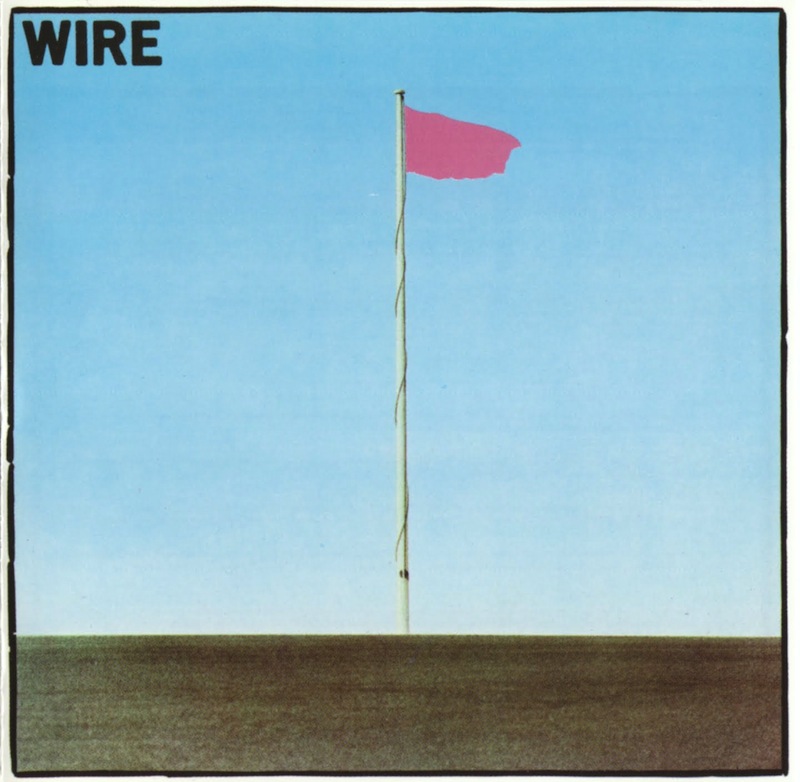Wire : Pink Flag

Wire earned the somewhat dubious, definitely hilarious tag “The Ramones With a Ph.D.” based on their debut album, 1977’s Pink Flag. The British group, which disbanded and reformed a handful of times since first forming in the late ’70s, has been one of the most innovative and unpredictable bands we’ll ever hear in our time. Wire was not part of any punk scene when they broke out in England in the late ’70s—they didn’t even consider themselves punk, as loose a term as that might be. On a close listen, they bore little resemblance to the other acts of the day—The Saints, The Sex Pistols, The Damned—delivering a sound more fragmented and disorienting than punk was, initially. Abandoning traditional song structure, paying little mind to song length, ignoring the notion of hooks—Wire was doing something very different.
Pink Flag ran a parallel course to another iconic debut released the same year: Talking Heads ’77. Four art students got together to form a band, only to toss away whatever conventions had been established within the genre of music rising up around them. If Wire wanted to play a three-minute song, they did. If 28 seconds would suffice (like on the standout “Field Day for the Sundays”), that was all they would record. Wire—at least in their early years—was the most economical band in history (possible contender: The Minutemen), erasing any unnecessary fluff, compressing songs into rough, yet awe-inspiring art punk gems.
Knowing Wire’s reputation, it’s amazing that Pink Flag was ever made. Colin Newman, Bruce Gilbert, Robert Gotobed and “Lewis” abandoned songs whenever they got bored of them, ideas piling up on the cutting room floor before anyone even had a chance to hear them. The 21 that found their way onto Pink Flag, however, are as perfect as punk songs get, if that isn’t an oxymoron. From the droning “Reuters” to the manic pulse of “12XU,” every track is a classic. Even the brief instrumental “Commercial” feels necessary, opening the gate from Side 1 to Side 2.
“Three Girl Rhumba” is the song that brought Wire some renewed attention in the ’90s, after Elastica aped its riff for their hit “Connection.” Though Wire’s original, by comparison, is rougher, less straightforward and, of course, less tied to commercial songwriting convention. “Ex-Lion Tamer” is the first instance of a proper pop song structure on the album, choruses and all. Referencing the Lone Ranger and Tonto, it culminates in a refrain of “stay glued to your TV set.” Wire even got funky when they wanted to, as on the lazy grooves of “Lowdown” and “Strange,” the latter of which was later covered by REM on their Document album. One aspect, of note, about “Strange” is the, well, strange warbling sound near the end of the song. Producer Mike Thorne recorded his flute teacher playing ten alto flutes, simultaneously, a semitone apart. The end result is the unsettling noise you hear on the album.
There are many moments of what one would ordinarily call “punk,” like “Field Day for the Sundays,” “Start To Move” and the ultra-catchy “It’s So Obvious.” Even with three chords, Wire had sophistication, albeit one that was mixed with a fair share of sass. Even “Mr. Suit” veered into snotty rebellion, lyrically: “You can take your fucking money and shove it up your arse/ ‘cos you think you understand/well what a fucking farce.” But on a song like “Fragile” or “Mannequin,” the band could switch gears again, taking on jangle-pop with ease.
Of all the songs, the most incredible triptych is at the very end. Starting with “Champs,” the band injects danceability into punk, a year before Blondie earned their disco hit with “Heart of Glass.” Then, “Feeling Called Love” offers a philosophical look at emotions over a mid-tempo melody. And lastly, the infamous “12XU” creates something bizarre and exciting out of a typical punk rock song. Short on lyrics, the song is more like a Zen mantra, Newman chanting “I saw you in a mag/kissing a man” over and over again, as the rest of the band plays a repetitive, yet rapid-fire melody with the utmost precision. Supposedly, it was the hardest song for the band to record, and there’s even an apparent tension on record, where everything sounds as if it’s about to fall apart. They pulled it together, however, and on their 2003 Send tour, a comeback of sorts after not releasing new material for over a decade, “12XU” made it on to most of the setlists.
When Pink Flag was reissued on CD by Restless Retro, an extra track, “Options R,” was added. Producer Mike Thorne wasn’t particularly happy about it, as it seemed to disrupt the natural flow. But in its 90-second wonder, it is a damn good song. Whether it’s the 21 or 22 song version, Pink Flag is still a mind-blowing listen. While there are many bands that were influenced by it, it is, oddly, the only album in the band’s catalog of its kind. On 1978’s Chairs Missing, the band went in a very different direction, making a tweaked sort of post-punk art rock and on 1979’s 154, took yet another turn. But that was the nature of Wire. As soon as they were tired of one thing, they simply moved on to the next.
Similar Albums/Albums Influenced:
 Buzzcocks – Singles Going Steady
Buzzcocks – Singles Going Steady
 Mission of Burma – Vs.
Mission of Burma – Vs.
 Joy Division – Unknown Pleasures
Joy Division – Unknown Pleasures
Jeff Terich is the founder and editor of Treble. He's been writing about music for 20 years and has been published at American Songwriter, Bandcamp Daily, Reverb, Spin, Stereogum, uDiscoverMusic, VinylMePlease and some others that he's forgetting right now. He's still not tired of it.

